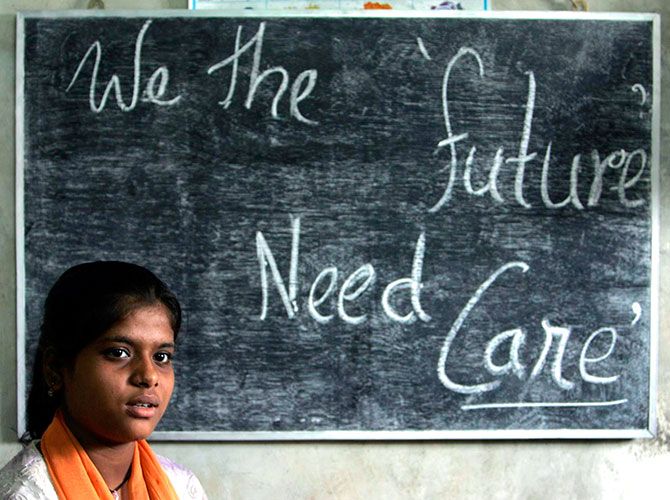'In this resurgent India, class is the new caste. We are shaken up only occasionally, and briefly, when a battered, tribal teenager from Jharkhand looks us in the eye from our closet,' says Shekhar Gupta.
 A well-to-do Gurgaon couple was accused on Thursday of repeatedly beating up their 14-year-old maid-servant, a tribal from Jharkhand. She was, in fact, rescued from behind a cupboard where she was hiding, or was forcibly confined.
A well-to-do Gurgaon couple was accused on Thursday of repeatedly beating up their 14-year-old maid-servant, a tribal from Jharkhand. She was, in fact, rescued from behind a cupboard where she was hiding, or was forcibly confined.
She had bruises, cut-and-slash marks. She told TV channels she was beaten routinely, thrown against a wall and even cut with a knife. Perhaps the most chilling part: she said her employers beat her, and all they said was they 'didn't like' her.
This was a most extreme case of servant abuse, but it is not isolated. It was also in Gurgaon recently enough that another house-maid, in this case of Nepali origin, was rescued from a Saudi diplomat's home after being confined and repeatedly raped and brutalised, ISIS-style.
The social and police response to the latest Jharkhand case has been prompt probably because of the sensitisation by the Saudi diplomat story. This business of the employer-servant, or malik-naukar, relationship is problematic in India. With rising prosperity and more double-income couples and nuclear families, the need for domestic help is increasing -- and so is the class divide.
We Indians are amongst the most 'servant'-dependent people in the world. From getting our dishes washed to our toilets cleaned, our children minded to our dogs walked, from being driven to work to having our lunch boxes opened and our clothes ironed, our need for domestic servants is total, at least 16x7, leaving out the sleeping hours. The term for these workers, even in the mainstream English press, is, simply, 'domestics.'
As more and more people become prosperous and busy -- or lazy -- enough to employ domestic help, more men and women from the poorest end of society walk into their lives and households. Cooks, drivers, security guards (who are essentially doormen), cleaners, house-keepers, valet and baby-sitters are still within the conventional parameters of our typical upper/upper middle class existence.
You want to know how one-sided this buyers' market in semi-skilled employment is? Manish Sabharwal, who runs Teamlease, India's largest third-party employer and arranger of low- and mid-skilled labour, makes a sobering point: “For the past five years our company has employed a new person every five minutes. And it has only employed about five per cent of all the people who apply to us.
In a 2008 article ('Exploring India's prosperity through the eyes of the invisible men') in The New York Times that stays on my mind, reporter-writer Anand Giridharadas had explored the same rising divide using a five-star hotel toilet as a telling metaphor.
In these toilets, he said, people are divided in two categories. Those who have to use soap from the dispenser, and those who squeeze the dispenser for you, open and close the tap, hand you a towel, take it back in their gloved hands to bin it, wipe the tap and mutter thank-you as you walk out, tip or no tip.
Our vast reservoir of cheap manpower leads to other creative uses. On the corporate floors of some of our richest old companies, a peon follows you, either turning polished brass door-handles for you with gloved hands, or, if you turn them instead, wiping them clean again with a lint. Many upscale hotels now have personal butlers and valets, which can be flattering, but many Western travellers find the 'privilege' intrusive.
The growing economy has only worsened attitudes. A couple with three small kids now employs three maids, one for each. These are dragged along to restaurants, kitty parties and flights when families travel on holidays.
This dependence is serious but is made affordable by the creation, and wide acceptance, of a large, uncomplaining 'below-stairs' class, a concept from Victorian Britain where your servants slept in the confined spaces under the staircases of your homes. Check out the coffin-sized sleeping slots that pass for 'servant quarters' in our new apartment buildings.
This sense of entitlement was brought to us most strikingly by the Devyani Khobragade episode, which essentially implied that besides diplomatic immunity, every entitled Indian had a fundamental right to a cheap housemaid.
Even an avowedly pro-poor and left-of-centre government ruined its relations with its most important ally; and the media rallied behind the diplomat, dismissing the maid as a foreign collaborator to bring India in disrepute and ungrateful that she had this job, never mind the minimum wages.
When I raised these points then in a National Interest ('Our Indian Feudal Service,' December 21, 2013), it drew instant opprobrium from the foreign service. That story, as we know, has fully unravelled now.
In his 2008 article, Mr Giridharadas drew on a Bollywood film on the lives of employers and their drivers then (Barah Aana) to make his point. The more recent Talvar, directed by Meghna Gulzar and written by my friend Vishal Bhardwaj, is my exhibit.
I have no view on the Aarushi-Hemraj case. I am only portraying the two sets, or classes, of human beings in that story. One soft, genteel, loving, hard-working, with victim written all over them. The other, boisterous, drinking, ogling, sniggering, even Mogambo-khush-hua laughs, with 'usual suspect' written all over them.
Most people, People Like Us, came back from the film shaken at the 'injustice,' and appreciated it when the next day's edition of The Times of India -- whose owner produced the film -- advised us to take our servants to watch this film, so you'd presume they can all feel guilty, and chastened.
Nobody cares to ask if that investigation, and the judicial process through 16 orders, including at the Supreme Court, was vitiated and manipulated, then how would three poor Nepali domestics have the power to do so rather than well-connected dentists?
Nobody notes that in the narco test, as shown in the film, the 'doctor' is willing to pump more brain-frying chemical into the servants' bodies than in the dentist couple. We snigger joyously when a CBI officer asks a bumbling, lowly UP cop to unbuckle his trousers and have his haemorrhoids fixed with his danda (I'd like to see a CBI officer actually do that to a state cop, least of all in a UP run by Ms Mayawati). The good CBI cop even thrashes a Nepali servant.
We think it's fine and the junior colleague who records this on his phone is a traitor, not a whistle-blower, as the case would surely have been if the dentists were beaten up. Why blame breathless film critics for not noticing these when a filmmaker as sensitive and aware as Vishal Bhardwaj has written the script?
In this resurgent India, class is the new caste and inevitably one dovetails neatly into the other. We are shaken up only occasionally, and briefly, when a battered, tribal teenager from Jharkhand looks us in the eye from our closet.
IMAGE: In this September 5, 2007 image, Rekha Sharma, 13, a house servant, attends a class at Sishu Sikha Niketa', a school for child labourers in Siliguri. The school, along with Ananda Vidya Mandir, another school for child labourers, is run by the Liberal Association for Movement of People, LAMP. Photograph/Rupak De Chowdhuri/Reuters











 © 2025
© 2025